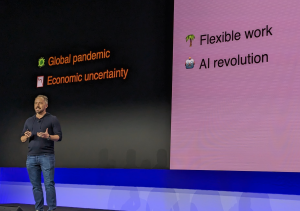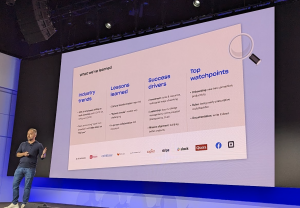Discussing the Westchester Publishing Services Client Portal
by Tyler M. Carey, Chief Revenue Officer
This week’s Dropbox Work in Progress conference in New York City was exciting whether you are a Dropbox power user or not. Topics covered included the new normal of what workplaces and productivity look like, supporting clients and staff with the right tools to get work done as well as communicate more effectively, and — threaded through pretty much every session and panel — the impact of AI on work itself. I was fortunate enough to participate in two back to back editions of a panel called “Scaling Success: the role of automation and collaboration in business growth.” More on what I shared there about our Client Portal, but let’s talk about what the overarching message of the day was, first.

The keynote by Dropbox CEO Drew Houston sets the table for a discussion all companies should have on an ongoing basis about how work is handled in a post-pandemic world, how we are supporting our team members, and how new tools — including AI — can be used to add to productivity when used with the right level of trust and responsibility.
Houston’s keynote is a must watch, and set the tone for the day. To cherry pick another highlight, I would also point to comments by one of the later panelists — John Horton, Associate Professor at MIT Sloan School of Management — who emphasized how AI benefits us most when paired with human beings to apply their judgment and selectively apply what AI can output, rather than just use AI output and guidance without consideration. That is right in line with how the best companies are using AI as a tool, rather than replacing proven expertise. Westchester, for instance, will never just dump a manuscript into an engine for copyediting – that negates the expertise we bring to every project. But, just like how our indexers using indexing software to create lists of terms, or we use NLP to create lists of keywords for marketing, it’s worth looking at what tools can help our editors, typesetters, sales people, and more with using their skills effectively.

Lest it be thought that the day’s content was just a one-time event-driven theme, it’s clear to see that Dropbox’s approach to making work easier – not just designing a strong file sharing and productivity platform – is baked into everything Dropbox does and communicates, right now. An op-ed in this week’s Independent (UK) by Dropbox’s Andy Wilson elaborates on the company’s approach to work – with an emphasis on finding ways to help users find info they need and avoid the constant distractions of email messages, Slack notifications, and other attention grabbers that, according to data cited in the article, eat up a typical 131 hours of each employee’s work time each year. You may remember Andy from our Work from Home webinar in March 2020, where he – in the thick of the initial pandemic lockdown – spoke about productivity and tools – and continues to share insights and solutions to this day. Andy will be co-presenting with me and Westchester’s COO, Deb Taylor, at the upcoming Digital Book World in January in NYC on just this, once again!

I was excited to join Debbie McClure, Dropbox’s Global Head of Sales, and Darci Kendall, Founder of Hodde Bros Beverage Co, on the two back-to-back sessions for our panel called “Scaling success: the role of automation and collaboration in business growth.” Debbie moderated the panel asking us questions about our businesses, our tech stack, the opportunities with AI (which I talked about in a recent blog post), and how we grow our businesses – and make our client experience better – by using different tools. Darci provided a lot of great examples of how she uses different channels to engage with her clients, and how she has grown from a small start up ten years ago into a top brand for the beverage and events industries. If your firm is a start up looking to grow, I really encourage you to look up the story of Hodde Bros Beverage Co and learn more.
So, why is Westchester’s story relevant enough to this topic that I was asked to come speak in these sessions at the event? Well, here’s an overview of what I shared during the panel, in narrative form.
Not long after Westchester became an employee-owned company in 2014, Westchester’s managers began highlighting areas where we could focus on a better client experience, as well as ways to grow our company. Our client experience at the time was in some ways fragmented, client by client. On one-hand, this was a bespoke solution for our clients — each client’s own workflow was tailored to, and supported as essentially its own unit here. But that worked well, for both us and our clients, when we had only forty clients to support, and most of those clients had one major line of work with us. But, as we started doing more work across organizations, we found that maybe one department liked to send us files via FTP en masse for typesetting and ePub conversion, and another department was essentially a smaller operation within the same firm that sent individual projects via WeTransfer for editorial and typesetting – and had wholly different style guidelines, schedules, and expectations. And as we moved into new markets back then — like the work we do for think tanks, legal publishers, trade associations, and more — we found that different types of clients had different needs and expectations for file transfer, schedules, communications, project involvement, and services.
To scale, Westchester needed a partner. After vetting many platforms, we selected Dropbox as our partner for file exchange and storage (to start). Clients could still send and receive files via FTP, WeTransfer, Box, Google Drive, what have you, but by setting up a number of processes on our end that talked to those different systems and pulled files into a central cloud-based Dropbox environment, we created efficiencies for us and for our clients.
And wow, did things grow from there! Dropbox was highly consultative, and our team identified use cases with the Dropbox API that let us build a custom project management system using our development team, and sitting on top of a trusted brand by using the Dropbox API for automations and process management, which expedited file transfer and made for a robust client experience. You’ve heard me talk about this in past blog posts, but this was the launch of our Client Portal. The Client Portal allows for easy transfer of files to Westchester via whatever means are best for you — but optimized for easy drop-off using Dropbox, even if you don’t have an enterprise account. No longer did clients have to log into a server, download assets, pass them to an author, gather those files back, upload them again… Steps like that became more automated and lightning fast.
Throughout each project, our clients can see the status of assets at each phase, download assets using downloadable links, and track the project schedule against milestones. None of these features, reports, or options for exchange replace the human interaction and customer care that Westchester is known for — we are just providing added transparency and options for engaging with your project’s assets. This has made for a great experience for our clients and has helped us scale our company as we have added more services and clients, growing from the forty-odd we had in the US back in 2014 to nearly 600 clients around the globe, today.
Beyond the Client Portal, Dropbox opened up its platform to us so that we could use more of their tools, including Dropbox Paper (which we use for many things including tracking client documentation, collaborating on marketing pieces, and planning projects), Dropbox Sign (which we use for contracts and onboarding clients within certain units of our company), DocSend (which we use for maintaining a library of marketing collateral for our sales and marketing teams to engage with clients and prospects about meaningful, relevant case studies), Dropbox Capture (which helps with internal training and other use cases for sharing content with narration), and more. Dropbox has been a phenomenal partner, and we rely on their platform, products, experience, consultation, innovation, and highly regarded security as a key element of not just our tech stack, but also how we support our staff and our clients.
While I’m excited about our above use cases that I shared on the panel — as well as further discussions we had about AI, marketing, and client engagement — that’s not the end of the story. We continue to have very detailed workflow conversations with dozens of accounts each week – both existing partners looking to address new products or challenges, as well as exploratory discussions with new, potential clients. Our editorial, production, and digital services are a cornerstone to the workflows for our nearly 600 clients around the world for a reason, and the blend of people skills and technology we are known for is key to their success. If you are a publisher, the chances are very good that we have had to solve any of the editorial or production challenges that you are currently facing. Contact Us to discuss your needs, and explore ways that US employee-owned Westchester Publishing Services can help.
 2023 has been another busy year here at US employee-owned Westchester Publishing Services, as we continue to expand our stateside and offshore operations to further support our clients’ editorial and production needs. In addition to our standard editorial and production work, we are supporting numerous clients who are expressing increased interest in scanning backlist titles, print-on-demand file requirements, accessible ePubs, developmental editing, permissions, and author support tasks. Across our global operations based in the US, UK, and India, we now support approximately 600 clients around the world. We appreciate the feedback from these partners that has helped us better understand how we can work with publishers and content providers to resolve their problems and deliver quality publications to their readers.
2023 has been another busy year here at US employee-owned Westchester Publishing Services, as we continue to expand our stateside and offshore operations to further support our clients’ editorial and production needs. In addition to our standard editorial and production work, we are supporting numerous clients who are expressing increased interest in scanning backlist titles, print-on-demand file requirements, accessible ePubs, developmental editing, permissions, and author support tasks. Across our global operations based in the US, UK, and India, we now support approximately 600 clients around the world. We appreciate the feedback from these partners that has helped us better understand how we can work with publishers and content providers to resolve their problems and deliver quality publications to their readers. George Baier IV is Media Industry Principal at Dropbox, responsible for communicating the company’s unique perspective on how Dropbox can transform work and IT infrastructure for customers in the media vertical. George works closely with customers to deliver product features and solutions that meet specific media customer needs.
George Baier IV is Media Industry Principal at Dropbox, responsible for communicating the company’s unique perspective on how Dropbox can transform work and IT infrastructure for customers in the media vertical. George works closely with customers to deliver product features and solutions that meet specific media customer needs.